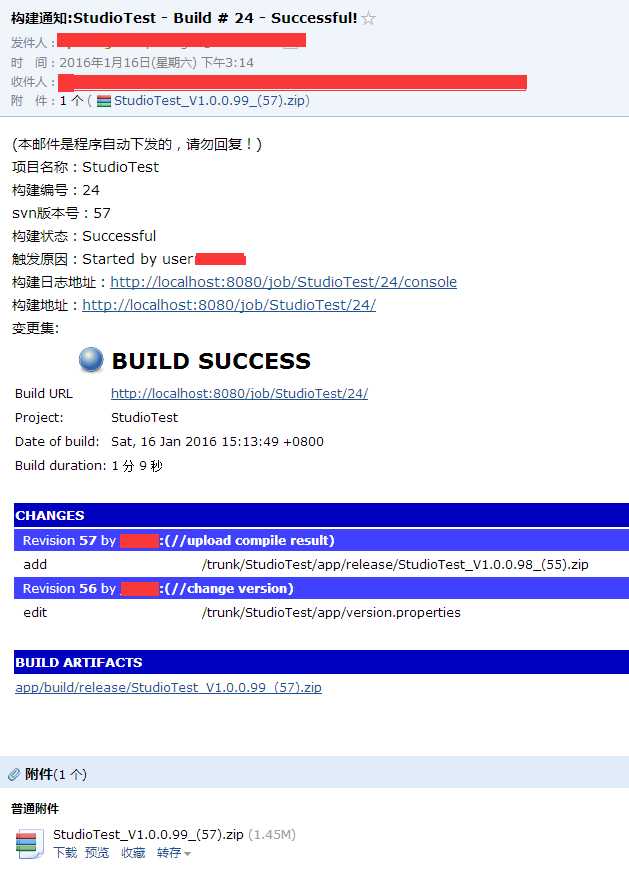标签:
先到Jenkins官网的Meet Jekins中看一下Installation部分,原文如下
You have several options for downloading and installing Jenkins:
*Use one of the platform-specific package/installer links on the Jenkins site to install Jenkins on your system.
*You can download jenkins.war directly and launch it by executing java -jar jenkins.war. This is basically the same set up as the test drive, except that the output will go to console, not to a window. On Windows, you can even choose to install Jenkins as a service afterwards.
*If you have a servlet container that supports Servlet 2.4/JSP 2.0 or later, such as Tomcat 5, you can deploy jenkins.war as you would any WAR file. See this document for more about container-specific installation instruction.
大概的看一下,意思就是说有好几种方法下载和安装Jenkins,针对windows操作系统可以选择的方法是,下载Jenkins提供的exe直接安装,以服务的方式运行,还有一种是下载Jenkins提供的war,war文件需要通过tomcat安装,还有许多的配置项需要设置,简单起见,本文采用exe的方式进行安装,下载完成之后解压出来,运行setup.exe,安装完成之后进入控制面板->管理工具->服务就可以看到jenkins。通过http://localhost:8080/就可以进入到jenkins的web页面了,如果需要配置jenkins的工作目录,先停止jenkins服务,然后再增加环境变量JENKINS_HOME即可。
还有几个插件要安装一下,进入到系统管理->管理插件->可选插件,安装一下Email Extension Plugin(用于邮件通知)和Gradle plugin(用于gradle编译)这两个插件。安装完成之后,再配置一些信息
Jenkins Location标签中
系统管理员邮件地址:sender@163.com
Extended E-mail Notification标签中
SMTP server : smtp.163.com
Default user E-mail suffix :sender@163.com
Default Content Type :Plain Text(text/plain)
Default Recipients :receiver1@163.com,receiver2@163.x,...,receivern@163.com
Reply To List : sender@163.com
Default Subject :构建通知:$PROJECT_NAME - Build # $BUILD_NUMBER - $BUILD_STATUS!
Default Content :
(本邮件是程序自动下发的,请勿回复!)<br/>
项目名称:$PROJECT_NAME<br/>
构建编号:$BUILD_NUMBER<br/>
svn版本号:${SVN_REVISION}<br/>
构建状态:$BUILD_STATUS<br/>
触发原因:${CAUSE}<br/>
构建日志地址:<a href="${BUILD_URL}console">${BUILD_URL}console</a><br/>
构建地址:<a href="$BUILD_URL">$BUILD_URL</a><br/>
变更集:${JELLY_SCRIPT,template="html"}<br/>
邮件通知标签中
SMTP服务器:smtp.163.com
用户名:sender
密码:xxxxxx
SMTP端口:选中SSL填465,没选中填25
Reply-To Address:sender@163.com
字符集:UTF-8
高级项目选项标签中
使用自定义的工作空间:可以配置自定义的工作空间
源码管理标签中Subversion
Repository URL: svn地址,注意这里都要填写小写的字母,否则如果真是svn路径中有大写字母的话,会导致svn版本号获取不到以及变更集获取不到
Local modle directory(optional):.
Repository depth:infinity
Check out Strategy:use ‘svn update‘ as much as possible
构建标签中
Gradle Version:选中最新版本吧,我选的是2.9
Tasks:clean buildAll,这个是build.gradle中的任务,后面会把测试工程的build.gradle放出来
构建后操作步骤中加入Archive the artifacts,Email Notificatioin,Editable Email Notification
Archive the artifacts标签中
用于存档的文件:app/build/release/*.zip
Email Notificatioin标签中
Recipients:收件人的名字,这里是配置发送编译错误以及编译恢复邮件的收件人
Editable Email Notification标签中
Project Recipient List:receiver1@163.com,receiver2@163.com,...,receivern@163.com
Project Reply-To List:$REPLAY_TO
Content Type:HTML(text/html)
Default Subject:$DEFAULT_SUBJECT
Default Content:$DEFAULT_CONTENT
这里是分割线,服务器的配置都ok了,Android Studio的工程当然也是要做一些配合才可以完成的,下面把Android Studio工程中app的build.gradle贴出来
import org.tmatesoft.svn.core.wc.* import org.tmatesoft.svn.core.wc2.* import org.tmatesoft.svn.core.* apply plugin: ‘com.android.application‘ android { compileSdkVersion 22 buildToolsVersion "22.0.1" defaultConfig { // 包名 applicationId "com.zhb.studiotest" minSdkVersion 19 targetSdkVersion 22 versionCode 1 versionName "1.0.0.1" manifestPlaceholders = [ CHANNEL_NAME:"Unspecified",APPLICATION_LABLE:"StudioTest"] } sourceSets.main.jni.srcDirs = [] sourceSets.main.jniLibs.srcDir ‘src/main/libs‘ def versionPropsFile = file(‘version.properties‘) if (versionPropsFile.canRead()) { def Properties versionProps = new Properties() versionProps.load(new FileInputStream(versionPropsFile)) def prename = versionProps[‘VERSION_NAME_MAJOR‘] def name = versionProps[‘VERSION_NAME_BUILD‘].toInteger() def runTasks = gradle.startParameter.taskNames if (‘buildAll‘ in runTasks) { name++ } versionProps[‘VERSION_NAME_BUILD‘]=name.toString() versionProps.store(versionPropsFile.newWriter(), null) defaultConfig { versionName prename + name } } signingConfigs { releaseConfig { // 写死签名密码 keyAlias ‘haibo.zhou‘ keyPassword ‘hbzhou0622‘ storeFile file("keystore.jks") storePassword ‘hbzhou0622‘ // 要求输入签名密码 // storeFile file("keystore.jks") // keyAlias System.console().readLine("\nkeyAlias: ") // storePassword System.console().readLine("\nKeystore password: ") // keyPassword System.console().readLine("\nKey password: ") } } /*productFlavors { xiaomi { applicationId = "com.zhb.xiaomi" manifestPlaceholders = [UMENG_CHANNEL_VALUE: name,APPLICATION_LABLE:name] } baidu { applicationId = "com.zhb.baidu" manifestPlaceholders = [UMENG_CHANNEL_VALUE: name,APPLICATION_LABLE:name] } wandoujia { applicationId = "com.zhb.wandoujia" manifestPlaceholders = [UMENG_CHANNEL_VALUE: name,APPLICATION_LABLE:name] } }*/ productFlavors { wandoujia {} baidu {} //c360 {} //uc {} productFlavors.all { flavor -> applicationId = "com.zhb."+name flavor.manifestPlaceholders = [UMENG_CHANNEL_VALUE: name,APPLICATION_LABLE:name] } } buildTypes { debug { buildConfigField "boolean", "LOG_DEBUG", "true" versionNameSuffix "-debug" // 混淆开关 minifyEnabled false // 在Android中,每个应用程序中储存的数据文件都会被多个进程访问: // 安装程序会读取应用程序的manifest文件来处理与之相关的权限问题; // Home应用程序会读取资源文件来获取应用程序的名和图标; // 系统服务会因为很多种原因读取资源(例如,显示应用程序的Notification); // 此外,就是应用程序自身用到资源文件。 // 当资源文件通过内存映射对齐到4字节边界时,访问资源文件的代码才是有效率的。 zipAlignEnabled false // 删除没用的资源文件 shrinkResources false } release { buildConfigField "boolean", "LOG_DEBUG", "false" minifyEnabled true zipAlignEnabled true shrinkResources true // 混淆文件 proguardFiles getDefaultProguardFile(‘proguard-android.txt‘), ‘proguard-rules.pro‘ // 签名 signingConfig signingConfigs.releaseConfig applicationVariants.all { variant -> // 修改APK名称 variant.outputs.each { output -> def file = output.outputFile def fileName = file.name fileName = fileName.replace(".apk", "-V${defaultConfig.versionName}.apk") fileName = fileName.replace("app", "StudioTest") fileName = fileName.replace("debug-unaligned", "debug") output.outputFile = new File(file.parent, fileName) } // 修改values.xml variant.mergeResources.doLast(){ File valuesFile = file("${buildDir}/intermediates/res/merged/${variant.dirName}/values/values.xml") String content = valuesFile.getText(‘UTF-8‘) content = content.replaceAll("CHANNEL_NAME","${variant.productFlavors[0].name}") valuesFile.write(content,‘UTF-8‘) } } } } } def getSvnRevision(){ ISVNOptions options = SVNWCUtil.createDefaultOptions(true); SVNClientManager clientManager = SVNClientManager.newInstance(options); SVNStatusClient statusClient = clientManager.getStatusClient(); SVNStatus status = statusClient.doStatus(project.rootDir, false); SVNRevision revision = status.getRevision(); return revision.getNumber(); } task svnCommitVersionFile(){ description = "Commits a single file to an SVN repository" doLast{ if (!project.hasProperty("commitMsg")){ ext.commitMsg = "//change version" } SvnOperationFactory svnOperationFactory = new SvnOperationFactory() def authentication = SVNWCUtil.createDefaultAuthenticationManager("haibo.zhou", "hbzhou0622") svnOperationFactory.setAuthenticationManager(authentication) try { SvnCommit commit = svnOperationFactory.createCommit() commit.setSingleTarget(SvnTarget.fromFile(new File(‘app/version.properties‘))) commit.setCommitMessage(commitMsg) SVNCommitInfo commitInfo = commit.run() println "Commit info: " + commitInfo println "Commit message: " + commitMsg } finally{ svnOperationFactory.dispose() } } } task generateZip(type: Zip){ def versionPropsFile = file(‘version.properties‘) def Properties versionProps = new Properties() versionProps.load(new FileInputStream(versionPropsFile)) def prename = versionProps[‘VERSION_NAME_MAJOR‘] def name = versionProps[‘VERSION_NAME_BUILD‘].toInteger() def version = "V" + prename + name + "_(" + getSvnRevision() + ")" from ‘build/outputs‘ archiveName "StudioTest_" + version + ".zip" destinationDir file("build/release") doLast(){ copy{ from ("build/release/"+archiveName) into ("release") } if (!project.hasProperty("commitMsg")){ ext.commitMsg = "//upload compile result" } SvnOperationFactory svnOperationFactory = new SvnOperationFactory() def authentication = SVNWCUtil.createDefaultAuthenticationManager("haibo.zhou", "hbzhou0622") svnOperationFactory.setAuthenticationManager(authentication) try { SvnScheduleForAddition add = svnOperationFactory.createScheduleForAddition(); SvnTarget target = SvnTarget.fromFile(new File("app/release/"+archiveName)); add.addTarget(target); add.setAddParents(true); add.setForce(true); add.run(); SvnCommit commit = svnOperationFactory.createCommit() commit.setSingleTarget(SvnTarget.fromFile(new File("app/release/"+archiveName))) commit.setCommitMessage(commitMsg) SVNCommitInfo commitInfo = commit.run() println "Commit info: " + commitInfo println "Commit message: " + commitMsg } finally{ svnOperationFactory.dispose() } } } // build script for jenkins only task buildAll(){ println ‘start build‘ } svnCommitVersionFile.dependsOn build generateZip.dependsOn svnCommitVersionFile buildAll.dependsOn generateZip tasks.withType(JavaCompile) { compileTask -> compileTask.dependsOn ndkBuild } task ndkBuild(type: Exec) { workingDir file(‘src/main/jni‘) commandLine getNdkBuildCmd() } task cleanNative(type: Exec){ workingDir file(‘src/main/jni‘) commandLine getNdkBuildCmd(), ‘clean‘ } clean.dependsOn cleanNative def getNdkDir() { if (System.env.ANDROID_NDK_ROOT != null) return System.env.ANDROID_NDK_ROOT Properties properties = new Properties() properties.load(project.rootProject.file(‘local.properties‘).newDataInputStream()) def ndkdir = properties.getProperty(‘ndk.dir‘, null) if (ndkdir == null) throw new GradleException("NDK location not found. Define location with ndk.dir in the local.properties file or with an ANDROID_NDK_ROOT environment variable.") return ndkdir } def getNdkBuildCmd() { def ndkbuild = getNdkDir() + "/ndk-build" ndkbuild += ".cmd" return ndkbuild } dependencies { // 工程目录里面的libs文件夹下所有的jar包 compile fileTree(dir: ‘libs‘, include: [‘*.jar‘]) // 网络仓库里面的工程 //compile ‘com.github.chrisbanes.photoview:library:1.2.4‘ // 本地的工程 compile project(‘:PhotoView-master‘) }
大概描述一下脚本,在控制台运行gradle buildAll,将会把build/output目录打成压缩生成到build/release目录,并自动修改版本号文件version.property提交到svn,同时将编译结果提交到svn。
ok,在到我们的jenkins里面,编译一下,结果生成了,看一下我们收到的邮件

编译日志,编译结果,上一次构建到这次构建的svn提交记录都可以看到了,作为一个简单的持续集成环境还是可以的。
2016.01.16
------End------
jenkins+svn+android studio自动化构建(持续集成)
标签:
原文地址:http://www.cnblogs.com/zhouhaibo/p/5135620.html